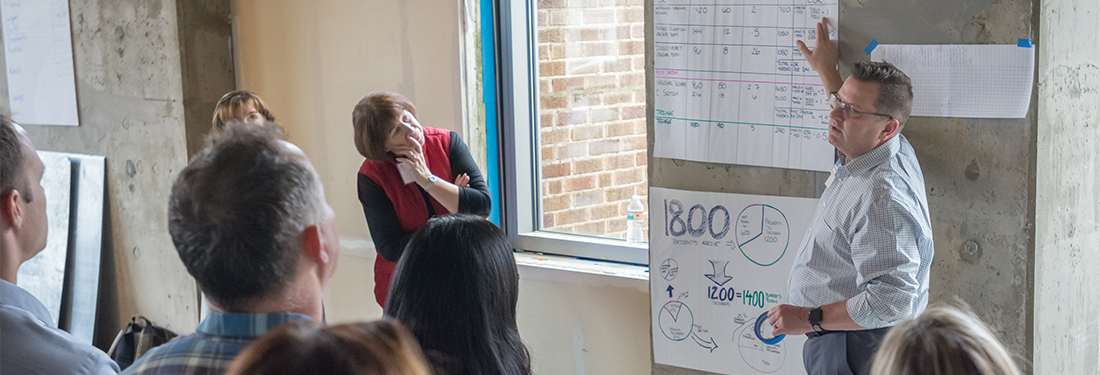5 Ways Patients Can Help Organizations Shape Quality Improvement
An interview with Phil Fergusson, a patient partner at Virginia Mason
Phil Fergusson is a volunteer who participates in the Patient-Family Partner Program at Virginia Mason. He has provided more than 315 hours of volunteer time in multiple improvement events, on the organization’s bioethics committee and other projects. Phil has dedicated hundreds of hours to promote the importance of continuous learning in healthcare organizations, and continuous care improvement.
Why did you choose to be a part of the Virginia Mason Patient Family-Partner Program?
PF: I chose to be a part of the program because for the more than 30 years I have been engaged as a patient or in a professional capacity, Virginia Mason has demonstrated clinical and research expertise in a variety of disciplines. Since 2002, the organization has utilized a quality improvement process that has national acclaim and is dedicated to improving patient care.
I also had the desire to leverage my national professional experience, having worked with a wide range of health care organizations collaborating on health economic evaluations and integrating new, innovative technology into health care systems.
The Patient-Family Partner Program also brings several elements to the quality improvement process:
- Outside perspective to challenge the standard way of doing things, accepted jargon or intricate processes
- Ability to share honest opinions without any “reporting lines”
- A variety of experience and expertise to generate new concepts and ideas that often prompt breakthrough thinking
- Validation for teams that their energy and time is well spent and valued by patients — keeping the enthusiasm high. Team members genuinely appreciate having a patient on the team. Being involved in a process-improvement event often leads to engagement and contributions in other unexpected areas. Besides taking part in improvement events, I have expanded my volunteer role to improve processes as a bioethics committee member, a speaker at sponsored staff and patient educational events, and an evaluator of website content marketing and patient-education material.
What has been your favorite improvement event thus far?
PF: The Revenue Cycle Staffing Rapid Process Improvement Workshop (RPIW) in June 2016 was probably my favorite. But, quite honestly, each event has taught me more about the complexities and interdependencies of a wide variety of systems within Virginia Mason.
We understand you have been trained in the Virginia Mason Production System® (VMPS). Can you describe if that has had any impact on how you view health care?
PF: I am impressed by the dedication Virginia Mason has to VMPS, a systematic and rigorous process to improve the health care delivery system and patient experience. This commitment has created the culture that optimizes patient care. In my professional past, perseverance was a distinguishing factor in effectiveness of long-term corporate projects. Virginia Mason’s management has demonstrated a willingness to “walk the talk” and “stay the course.” While trained to lead quality improvement programs in a health care manufacturing system, I was initially skeptical that the techniques could be effectively used in a direct patient care setting. I am no longer skeptical after participating in almost a dozen formal kaizen events.
“Virginia Mason staff, both clinical and nonclinical, really strive to do what’s best for patient care. It’s in the culture. From a patient’s perspective, it is reassuring to observe and it creates trust that the health care system has patient care as the highest priority.”
– Phil Fergusson
While participating on improvement events, did your viewpoint change the direction of the improvement work or staff members’ thinking?
PF: Yes. A patient-family partner can influence improvement work in five ways, by
- Redefining the scope of the original project after evaluating the interdependencies of the process being changed.
- Asking team members to fully explain why a process is done and how it supports the objectives it is supposed to meet.
- Identifying invalid assumptions.
- Providing an opportunity to contrast the workflow to that of a different industry that has similar process objectives, which frequently leads to generating new ideas.
- Holding team leaders accountable to not lose sight of important ideas from earlier stages of the workshop, especially when there is a stampede towards a particular direction. It is common in the excitement of a process-improvement event to rush to apparent solutions midway through the process and forget about key ideas that surfaced during the earlier brainstorming efforts.
Is there anything else you want to share? Something you would like leaders to know about the program or patient experience in general?
PF: Virginia Mason staff, both clinical and nonclinical, really strive to do what’s best for patient care. It’s in the culture. From a patient’s perspective, it is reassuring to observe and it creates trust that the health care system has patient care as the highest priority.
It is satisfying and rewarding to be part of the Patient-Family Partner Program. Learning more about the operations and staff expertise has reinforced my decision to continue being a Virginia Mason patient. I also have more of a vested interest in the success of Virginia Mason, and I trust the system to take care of me and my family.





